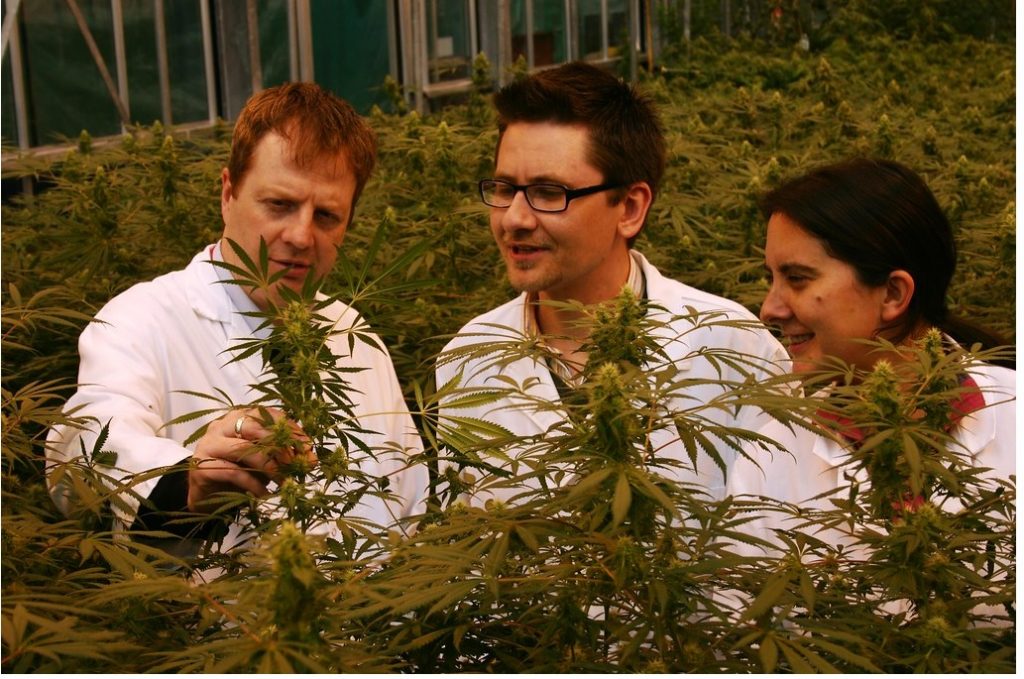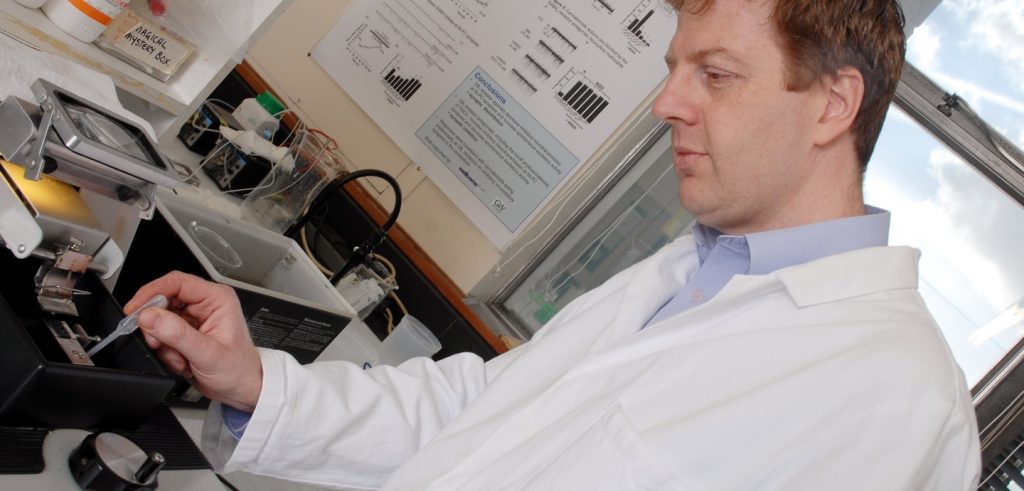Today a new cannabis-derived medicine for severe childhood epilepsy was approved for use on the NHS after over a decade of research at the University of Reading. Here we track the story of the drug’s long journey from bench to bedside.

Epilepsy affects around 50 million people across the world. Most patients can control their seizures using anti-epileptic drugs, but for 30% of epilepsy patients the drugs don’t work, or they produce side effects that cannot be tolerated.
Now, after many years of work at the University of Reading led by Professors Claire Williams, Gary Stephens and Ben Whalley, a new medicine – Epidiolex – has become the first cannabinoid-derived medicine to be approved for clinical use in epilepsy, providing a safe treatment for thousands of affected patients. This week it has crossed the final hurdle to become available to UK patients on the NHS. Here we tell the story of its development.

1996: Exploring compounds found in cannabis
A psychologist at the University of Reading, Dr Claire Williams, became involved in research on the 60 compounds derived from cannabis, known as cannabinoids, including looking at whether any of them had potential for alleviating epileptic seizures.
2000: Early evidence in brain slices
Pharmacist Dr Ben Whalley published work showing that the non-THC (tetrahydracannabinol) parts of cannabis can inhibit seizure-like activity in rat brain tissue slices in a laboratory dish. He studied the activity of networks of brain cells in tissue slices by measuring the flow of electrical currents through them, in order to better understand how changes to individual neurons can have an effect on the whole organism.
2007: Reading teams up with GW Pharmaceuticals
GW Pharmaceuticals – a pharmaceutical company and world-leader in plant-derived cannabinoid therapeutics – were keen to explore the compounds discovered by the Reading team further. By 2007, the University of Reading’s Dr Claire Williams, Dr Gary Stephens and Dr Ben Whalley were carrying out pre-clinical research for GW Pharmaceuticals and their drug discovery partner, Otsuka Pharmaceuticals.
2010: Cannabidiol shows promise in rats
The Reading research team published promising results from studies in rats. The research showed that two different non-psychoactive cannabinoids, one of which was cannabidiol (CBD), reduced the number and severity of seizure episodes in rats that had been treated to model the symptoms of epilepsy.
The group were awarded £1 million funding from GW Pharmaceuticals and Otsuka Pharmaceutical to expand their existing £0.5 million research collaboration.

2012: Cannabidiol stops seizures in rats
The Reading team showed that CBD and another largely ignored natural compound found in cannabis, cannabidivarin (CBDV), both strongly suppressed seizures in six different experimental epilepsy models in rats and mice, with no serious side effects. This suggested that they would be good candidates for anti-epileptic drug development.
2013: First trials in people
Research partners GW Pharmaceuticals began phase I clinical trials of new drugs containing CBD and CBDV in the US.
2014 – 16: CBD shown to reduce seizures in patients
Phase II and III trials of CBD in larger groups of patients followed soon afterwards. Children with rare childhood epilepsy syndromes Lennox-Gastaut Syndrome and Dravet Syndrome experienced fewer seizures when they were treated with the drug. The result saw GW Pharmaceuticals’ market value double overnight.
2018: US approval for Epidiolex
CBD was approved as the medicine Epidiolex by the FDA for use in Lennox-Gastaut syndrome and Dravet syndrome in the US in April 2018. In the first two months sales period following approval, net sales were $4.7m and over 500 physicians had prescribed the medication.
2019: Epidyolex gets green light for use on the NHS
European approval was granted for CBD as Epidyolex for Lennox-Gastaut syndrome and Dravet syndromes in September 2019, and National Institute for Health and Care Excellence (NICE) approval for use of the drug on the NHS followed on 11 November.
The University of Reading work on Epidiolex has been recognised by the British Pharmacological Society, which has awarded Williams, Stephens and Whalley the 2019 Sir James Black Award for Contributions to Drug Discovery.
Professor Gary Stephens commented: “The announcement that doctors can now prescribe the medicine Epidyolex on the NHS gives hope to young patients with drug-resistant, difficult-to-treat, epilepsies.
Such conditions can cause hundreds of seizures a day and are often fatal, with many patients unable to tolerate the side effects of existing drugs or taking medicines that simply do not help. We are delighted to see Epidyolex reach these patients after our many years of research.”
Further clinical studies are ongoing and positive results from Phase III trials for use of Epidiolex in Tuberous Sclerosis Complex – a condition associated with tumours that can cause seizures – means that its use is likely to be extended for the treatment of new diseases.
Fast facts
- When someone experiences a seizure, cells in brain called neurons have an excessive burst of electrical activity, causing signals between neurons to get mixed up. People with epilepsy experience seizures repeatedly and without warning.
- Researchers at the University of Reading including Professors Claire Williams and Gary Stephens and Professor Ben Whalley, now Director of Research at GW Pharmaceuticals, have each studied different aspects of this hyper-excitable state in neurons: Whalley’s expertise includes understanding how drugs act at the cellular level on hyper-excited neurons, and Williams work with animal models of epilepsy and seizures looks at how potential drugs affect seizures whilst Stephens’ expertise lies in the pathways of communication between neurons and how they are controlled.
- Only 1 in 1,000 new drug entities reach phase 1 trials. Williams, Stephens and Whalley’s research identified two drug candidates.
- Children with Lennox- Gastaut syndrome and Dravet’s syndrome can experience dozens of seizures daily. This can cause cognitive disabilities by the time they reach school age and confine them to a wheelchair before they reach secondary school. One third of these children will die before they reach adulthood. There are an estimated 8,000 young adults with the syndromes in England.
- 44% of Lennox-Gastaut syndrome patients who received cannabidiol had a 50% or more reduction in drop seizures compared to 23.5% of patients who received a placebo.
- Net sales of Epidiolex in the two month period from Nov-Dec 2018 reached $4.7m.
- University of Reading Scientists are co-inventors on several patents filed by GW Pharmaceuticals, relating to the use of CBD and/or CBDV in the treatment of epilepsy.
- CBD is marketed as Epidiolex in the USA and Epidyolex in Europe
